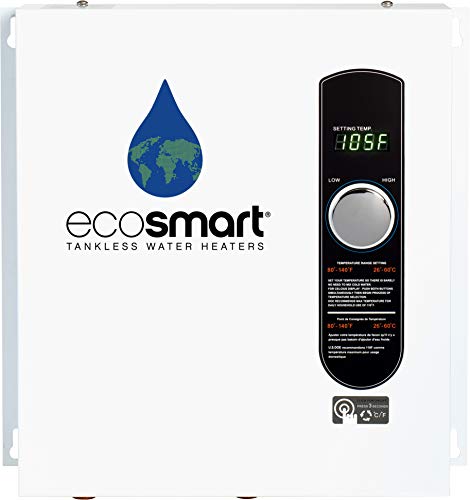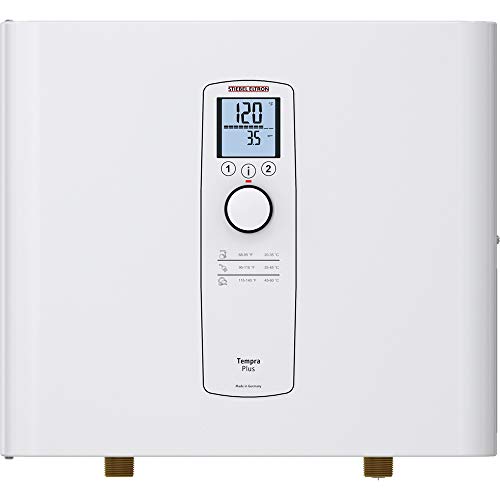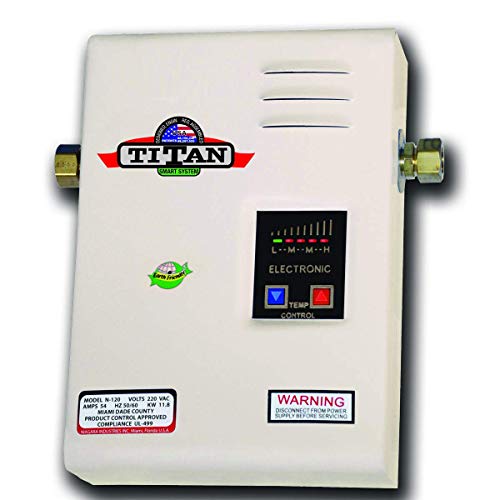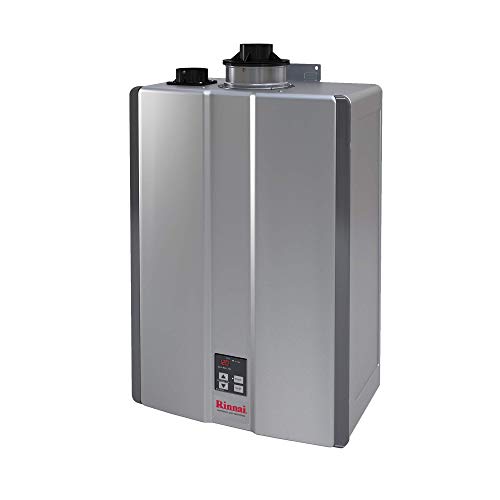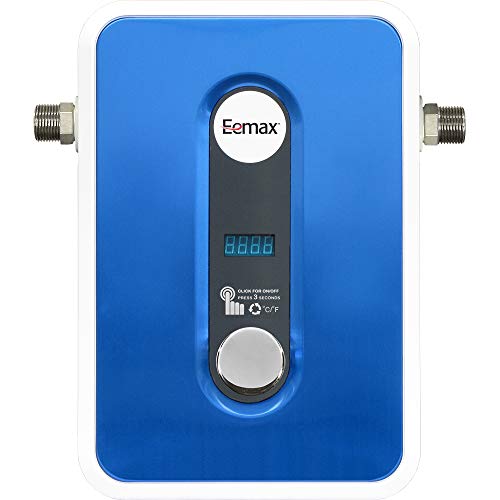The Best Tankless Water Heaters for 2022
/Best Tankless Water Heater
Disclaimer: As an Amazon Associate I earn from qualifying purchases. There are affiliate links in this post. This means that at no cost to you, I will receive a commission if you purchase through my link. I will only ever promote the products and services that I trust and 100% recommend. You may read my full disclosure policy for more information. Thank you for supporting my business in this way.
These units are a great way to provide continuous hot water while reducing energy use and saving space. To help you select which one is best for you, I have outlined the various features below along with a list of the best tankless water heaters currently available.
UPDATED: March 9, 2022.
MY TOP PICK:
If you are looking for the best overall, I recommend the EcoSmart ECO 27 because it offers a digital controller, stainless steel and copper components, and a compact design.
These tankless water heaters provide on-demand hot water by heating the water as it passes through the unit instead of the traditional tank water heater that simply stores the heated water until needed. This offers the advantage of reduced energy costs because it is only heating the water when it is needed instead of continuously maintaining a minimum tank temperature.
Another benefit is the compact size of these units, the wall-mounted design takes up a fraction of the space of a traditional hot water heater.
RELATED:
The Best Whole House Water Filters
The Best Kitchen Sink Faucets
Gas v. Electric
There are a couple of factors to consider when selecting the appropriate unit for your particular application. The first is the method of heating, the two primary options are natural gas and electricity. Obviously, if you do not have a gas connection this is not an option. You may also choose one or the other based on the rates in your specific area, although that can change over time.
These units can last up to 20 years it is also important to consider your long-term needs. For example, if you plan on installing solar panels or a backup generator, an electric heater may be a better choice since it could still operate in the event of a gas or power outage. Remember that a gas unit will still require a power source to operate its internal electronics.
Heater Materials
The materials the heater is constructed from are important especially since it is subjected to regular daily use and the internal components are exposed to a continuous flow of water. For these reasons, I recommend going with a unit that utilizes long-lasting materials such as stainless steel and copper.
Smart Systems
Some heaters include smart monitoring systems that allow you to manage them from your phone. Typically this consists of a module that connects to your home Wi-Fi allowing you to monitor alerts, manage schedules, and more.
BTU Rating
The heating capability of a natural gas heater is typically given in British Thermal Units per hour (BTU/h). This is sometimes just abbreviated as BTU. A BTU is simply a unit of heat. Technically, a BTU is just the heat required to raise one pound of water by one degree Fahrenheit. The important thing to know when it comes to heaters is that generally speaking the more BTUs per hour the more gallons per minute can be supplied.
Whole-House vs. Point-of-Use
The other factor to consider is whether or not the unit is being used to provide hot water to the entire house or for a single plumbing fixture. Whole-house units completely replace your existing hot water tank and provide hot water to all showers, sinks, the washing machine, dishwasher, etc.
“Point-of-Use” units on the other hand provide only hot water for only one fixture. For example, it can be placed under the kitchen sink to provide hot water at the source to supplement the primary water heater. This reduces the length of cold water sitting in the pipes so it is able to provide hot water faster while minimizing the water down the drain. These units are usually electrically powered since there is rarely a convenient gas connection nearby.
Determining Capacity For Whole House Systems
The flow rates will vary by model, but also this is determined by your location. For example, in a warmer part of the country, the incoming water will be at a higher temperature than in a colder area. This means that the water does not need to be heated up as much to reach the desired temperature. Therefore, it can provide a higher flow rate through the system and service more fixtures simultaneously. On the other hand, a lower incoming temperature would result in a lower flow rate. When the unit is appropriately sized it will essentially provide endless hot water.
Most manufacturers will offer charts to recommend a specific model based on the number of expected simultaneously running fixtures. So, if you require two shower heads running at the same time, that will require a larger unit. In addition, they typically provide a map to help you determine the average inlet water temperature in your region, see the example from Rinnai below.
Source: https://www.rinnai.us
In summary, to select a tankless water heater:
Natural gas or electric power?
Whole House or Point-of-Use?
How many simultaneously running fixtures are required? Use this to determine the minimum gallons per minute needed.
What is the average inlet water temperature? (whole house units)
Select a unit that meets the above conditions.
NOTE: for plumbing, electrical, and gas installation requirements please consult with a licensed professional.
Now, on to the individual products. Each unit included below has been assigned a key feature that makes it particularly noteworthy and has been broken down according to its essential functions to help you make an informed selection.
So here is my list of The Best Tankless Water Heaters for 2022.
Enjoy!
Best Overall: EcoSmart ECO 27 Electric Tankless Water Heater
The EcoSmart ECO 27 Electric Tankless Water Heater features a digital controller that provides adjustment down to one-degree increments.
Offers the ability to heat up to three gallons of water per minute at an incoming temperature of 37 degrees or up to 6 gallons per minute in warmer climates.
Equipped with stainless steel and copper components for long-lasting durability.
Includes a thermostat with an automatic reset.
Features a compact design with overall unit dimensions of 17" high x 17” wide x 3.625” deep.
Runner-up: Stiebel Eltron Electric Tankless Water Heater
The Stiebel Eltron Electric Tankless Water Heater features a flow control system that activates if the required GPM is in excess of the unit’s capacity it will then automatically reduce the flow of water.
Equipped with self-modulation to minimize the energy use of the system.
Offers the ability to continually monitor the incoming water temperature, the flow rate of water through the unit, and the outgoing water temperature.
Features an onboard system that engages the heating elements in stages to maximize efficiency.
Capable of maintaining a steady output temperature even if the flow rates vary.
Includes a simple temperature control knob with a digital display on the front cover to set the desired water temperature.
Features quiet operation by not using mechanical switches.
Best Point-of-Use: Bosch Tronic 3000 Electric Tankless Water Heater
The Bosch Tronic 3000 Tankless Water Heater offers point-of-use convenience for a kitchen or bathroom sink.
Offers the ability to tap into the existing cold water line and install it under a sink or counter to provide hot water.
Features a glass-lined tank for long-lasting use.
Includes CFC-free foam insulation to increase the unit’s energy efficiency.
Also available in two smaller sizes:
2.5 Gallon Mini Tank (ES2.5).
4 Gallon Mini Tank (ES4).
Equipped with a pressure relief valve.
Best Wi-Fi Monitoring: Rinnai V Series HE Natural Gas Tankless Water Heater
The Rinnai V Series HE Natural Gas Tankless Water Heater features ThermaCirc360 technology that recirculates hot water through the pipes.
Offers a flow rate of up to 6.5 gallons per minute.
Features a compact design that can be placed in a range of locations within the house.
Equipped with WiFi monitoring.
Includes efficient heating coils that activate and heat the water on demand.
Comes with enhanced scale detection to reduce potential damage to the system.
Includes a temperature lock to prevent unwanted changes to the unit.
Features up to 150,000 BTUs.
Best Value: EcoSmart ECO 11 Electric Tankless Water Heater
The EcoSmart ECO 11 Electric Tankless Water Heater is primarily designed as a whole house unit for warmer areas but can also function as a point-of-use in colder climates.
Equipped with a digital controller that provides adjustment down to one-degree increments.
Designed to provide up to two gallons per minute (for higher requirements select a bigger model).
Features 1/2” compression fitting plumbing connections.
Best for Warm Climates: Titan N-120 Electric Tankless Water Heater
The Titan N-120 Electric Tankless Water Heater features a compact design to minimize the required space.
Provides an outgoing water temperature of 105 to 120 degrees F.
Offers a flow rate of 2.3 gallons per minute at a 45 degree F rise.
Recommended use for areas with incoming water temperature above 65 degrees F.
Features a wall mount design.
Best High Flow Rate: Rinnai RU199iN Natural Gas Tankless Water Heater
The Rinnai RU199iN Natural Gas Tankless Water Heater features a flow rate of up to 11 gallons per minute.
Features a compact design that can be placed in a range of locations within the house.
Includes a temperature lock to prevent unwanted changes to the unit.
Features up to 199,000 BTUs.
Equipped with WiFi monitoring.
Features ENERGY STAR Qualification with an Energy Factor of 0.96.
Best Compact Design: Rheem RTEX-18 Electric Tankless Water Heater
The Rheem RTEX-18 Electric Tankless Water Heater features a compact design for installation in small areas.
Equipped with self-modulation to maintain a consistent outgoing water temperature.
Features an electronic control that allows for temperature adjustment in one-degree increments from 80 degrees to 140 degrees F.
Offers 3/4” connectors so it is compatible with a flex hose installation.
Eemax EEM24013 Point-of-Use Electric Tankless Water Heater
The Eemax EEM24013 is designed for either point-of-use applications or small residences with minimal flow rate requirements.
Equipped with a dial and digital temperature control readout.
Offers temperature increments of 1 degree F from 80 to 140 degrees F.
Includes a three-foot electric cable for easy installation.
Comes with NPT adapters and 1/2 inch CF connectors.
Best Modern Design: ECOTOUCH ECO90 Point-of-Use Electric Tankless Water Heater
The ECOTOUCH ECO90 Electric Tankless Water Heater offers a point-of-use design for sinks or other specific hot water uses.
Offers the ability to 1.5 gallons per minute from 67 to 106 degrees (F).
Features a modulating control system to adjusts the required power input based on the water flow rate.
Equipped with a real-time setting for stable water temperatures.
Features a wall-mount design to minimize the impact on floor space and provides a range of options for locating the unit.
Includes installation brackets, 1/2" NPT pipe fitting, and power cord.
I hope this list of the best tankless water heaters was helpful.
If you think I left out one that is important or have a suggestion for a future article, let me know in the comments below.
Brandon Hubbard, AIA, NCARB, LEED AP BD+C



